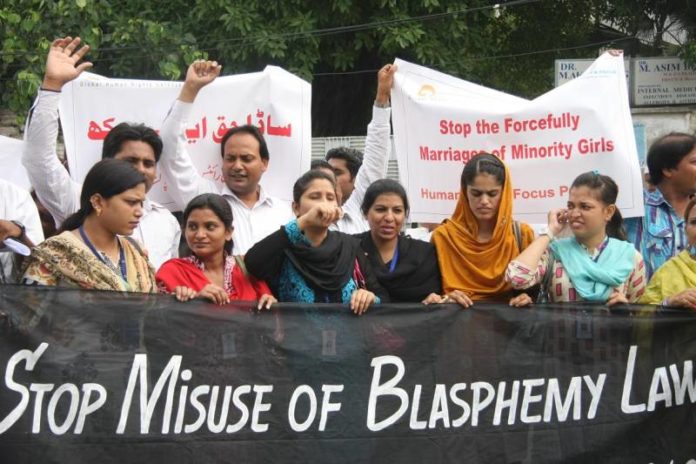As Pakistan grapples with the severe complexities of the blasphemy laws, it exposes the nation trapped in the collective struggle, drawing global attention to its quest for tolerance and coexistence.
Blasphemy encompasses acts or expressions that show profound disrespect to God or sacred entities. It is manifested through the words or deeds that are considered offensive. Moreover, it also refers to a belief or opinion that does not align with the established doctrine of a particular religion.
Pakistan has strict blasphemy laws that impose severe penalties for actions deemed offensive to religious sentiments. These laws, including Section 295 of Pakistan Penal Code, which deals with insults to places of worship, can lead to a minimum imprisonment of up to 2 years. Section 295A addresses malicious acts intended to outrage religious feelings, punishable by up to 10 years of imprisonment, and Section 295C mandates the punishment as much as the death of a person for derogatory remarks against Prophet Muhammad. The Ahmadi blasphemy laws, collectively known as Sections 298A, 298B, and 298C, target blasphemous statements about holy personages, and the misuse of titles by Ahmadis, with penalties ranging from imprisonment to fines.
Concerns and criticisms have been raised regarding the misuse and manipulation of these laws in the country. The critics contend that these regulations, which were originally intended to uphold religious sensibilities, have been exploited for personal agendas, land disputes, and targeting religious minorities. Accusations of blasphemy can have dire consequences, including imprisonment and even execution, fostering an atmosphere of fear and potential abuse.
According to the 2024 Annual Report by the United States Commission on International Religious Freedom (USCIRF), religious freedom in Pakistan deteriorated significantly in 2023. This was evidenced by increased persecution of minorities, such as Hindus, Christians, Sikhs, Shi’as, and Ahmadiyya Muslims. Common occurrences included blasphemy accusations, mob violence, lynching, forced conversions, attacks on places of worship, and desecration. The proposed reforms by the governments promised little to the situation; rather they added into the greater risks of exacerbating the situation. Apart from that. the surge in terrorist attacks kept targeting minorities and their places of worship. Overall, the report indicated the worsening conditions for religious freedom in Pakistan with minority communities facing heightened threats and violence.
Denying all these allegations, the Foreign Office spokesperson Mumtaz Zahra Baloch said in a press briefing, “It is unfortunate that the report refers to certain incidents in Pakistan last year without highlighting the strong political will demonstrated by the government to hold the perpetrators accountable as well as the remedial efforts undertaken and the legal and administrative protections in place for religious minorities.” The said office voiced the concerns of the government over data gathering and the drafting of the report.
Pakistan’s response to allegations of religious persecution contrasts sharply with recent events illustrating ongoing challenges. A 36-year-old tourist from Sialkot, Punjab, was killed and his body was burned in Madyan, Swat, Khyber Pakhtunkhwa, Pakistan. He was accused of desecrating the Quran, which led to a mob of hundreds attacking the police station, dragging him out, and ultimately killing him. The police have confirmed 32 arrests and filed a First Information Report (FIR). The incident is under investigation, and the Chief Minister has condemned the incident, directing the police to take emergency measures to control the situation. Another incident occurred in Lahore where a girl was accused of wearing a dress with Arabic calligraphy printed on it. She was attacked by a charged mob alleging she committed blasphemy. A heroic female officer of the Punjab police jumped into the pool of the mob and rescued her by taking timely action. Despite the official broaches, these events underscore the gap between official rhetoric and ground realities, prompting scrutiny of Pakistan’s efforts to ensure religious tolerance and protect vulnerable communities amidst rising incidents of violence and vigilantism.
Navigating a path to enact meaningful policy has been a hard net to crack for Pakistani authorities. Bringing a just and tolerant society with renewed efforts to promote interfaith dialogue, education, and community engagement has remained a cherished dream that needs vigilant eyes and sincere efforts to fulfill.
To reduce blasphemy cases in Pakistan, it is essential to reform blasphemy laws, promote religious tolerance, and strengthen the justice system to prevent false accusations and protect victims. Engaging with religious leaders to promote peaceful interpretations and condemn violence, improving education to emphasize religious tolerance, and collaborating with international organizations to share best practices can be steps toward a safer Pakistan. Together all stakeholders, from within and beyond, have to derive a roadmap that gives everyone a due position that is the core of Islamic ideology: religious freedom.




